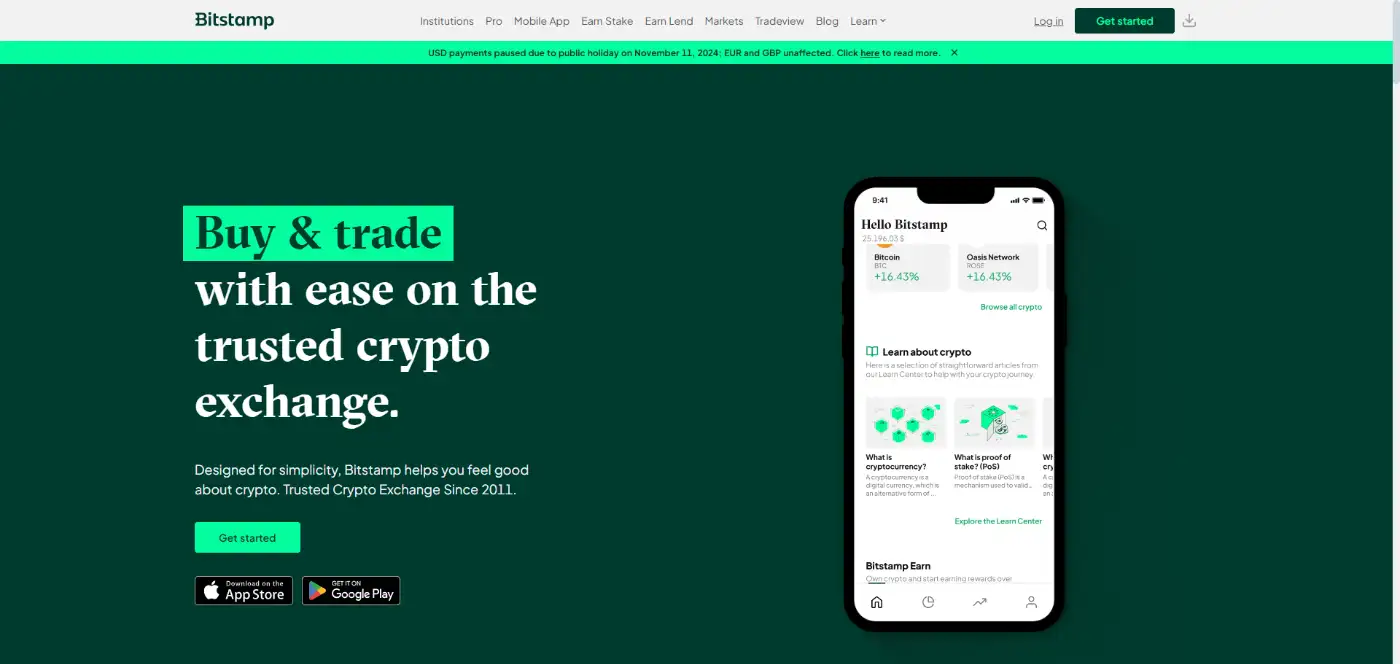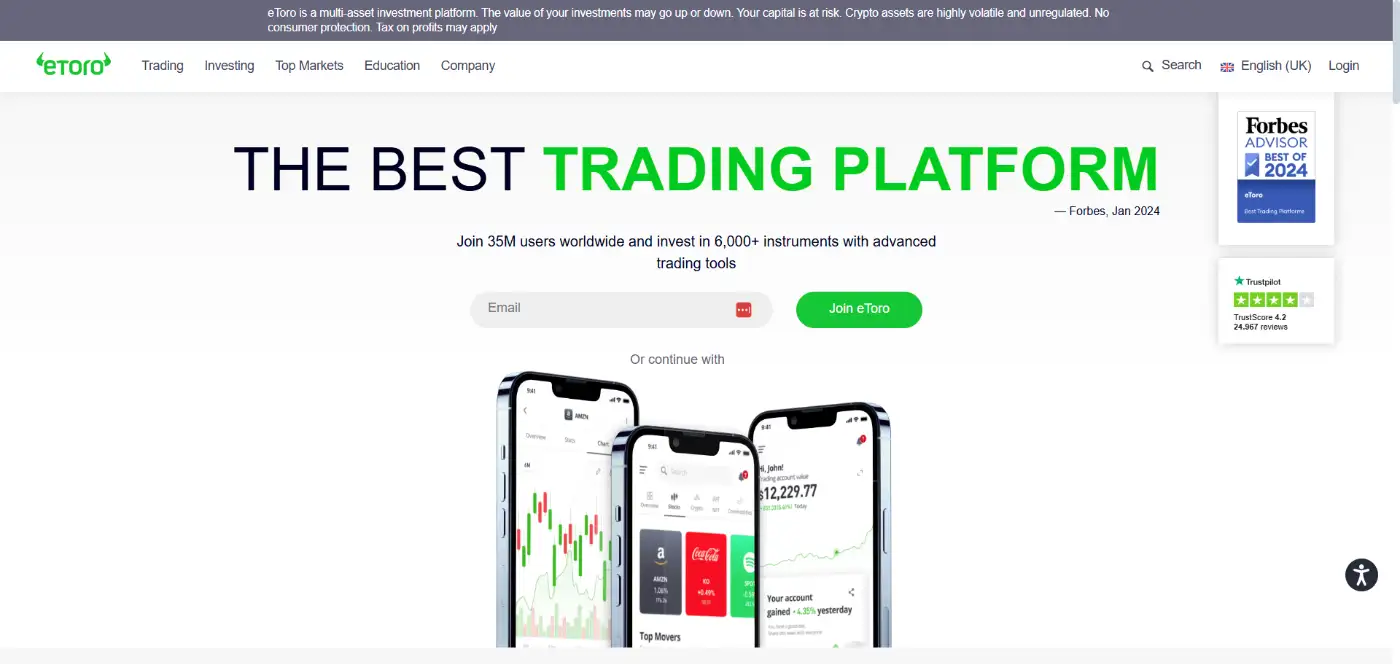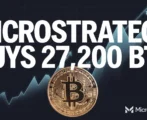As the cryptocurrency market continues to expand, Europe has emerged as a significant player in the global crypto landscape. With numerous crypto exchanges catering to a diverse range of users—from seasoned traders to beginners—choosing the right platform is crucial.
Security, fees, user experience, and the range of cryptocurrencies available can all have a huge impact on the success of trading.
This is a broad guide that examines some of the top cryptocurrency exchanges in Europe, assessing their pros and cons to guide you toward the right choice.
- What Is A Crypto Exchange And How Does It Work?
- Types Of Cryptocurrency Exchanges
- Crypto Laws In Europe
- MiCA Regulation
- Anti-Money Laundering (AML) Directives
- Taxation Of Cryptocurrencies
- Consumer Protection Measures
- 8 Best Crypto Exchanges in Europe
- Conclusion
- FAQs
What Is A Crypto Exchange And How Does It Work?
A crypto exchange is a place where you can buy and sell cryptocurrencies like Bitcoin, Ethereum, and others. These exchanges are similar to other crypto trading platforms you might know.
They let you set up accounts where you can place different types of orders to buy, sell, and speculate in the crypto market. Some exchanges offer advanced features like margin accounts and futures trading.
Others let you stake your crypto or take out loans so you can earn interest on what you hold. Overall, crypto exchanges are like brokerage platforms, providing a way to trade cryptocurrencies with other users.
The best ones even have educational resources to help you stay informed about everything happening in the crypto world.
Types Of Cryptocurrency Exchanges
Cryptocurrency exchanges can be categorized into different types, each offering unique features and functions.
Centralized Exchanges (CEXs)
Centralized Exchanges (CEXs) are the most prevalent type of cryptocurrency exchange. They are usually custodial platforms managed by central organizations that facilitate transactions between buyers and sellers.
Users must create accounts to deposit funds, while the exchange acts as an intermediary, holding user funds and executing trades for them.
CEXs usually provide user-friendly interfaces that help newcomers navigate and conduct trades easily. They often have high liquidity, with many buyers and sellers available, allowing for quick order fulfilment and minimal price discrepancies.
Centralized exchanges typically support a wide range of trading pairs, including various fiat currencies and numerous cryptocurrencies.
Additionally, many CEXs offer advanced trading options such as spot trading, margin trading, futures, and options, catering to both novice and experienced traders.
Decentralized Exchanges (DEXs)
Decentralized Exchanges (DEXs) differ from centralized exchanges in that they allow users to trade cryptocurrencies directly with one another without a central authority.
Peer-to-peer trading on DEXs is performed using smart contracts—self-executing agreements with terms written in code. This process ensures automatic, private, and fair trades.
DEXs are usually non-custodial, meaning users maintain control of the private keys of their wallets. They also typically have fewer requirements for Know Your Customer (KYC) verification compared to centralized exchanges.
However, new regulations in regions like Europe are prompting decentralized platforms to comply with KYC and Anti-Money Laundering (AML) laws.
Hybrid Exchanges
Hybrid Exchanges combine elements of both centralized and decentralized exchanges to offer benefits from each. These platforms may use centralized order matching while allowing users to keep control of their funds.
This mix makes hybrid exchanges appealing to individuals seeking advantages from both traditional and decentralized finance. They often feature advanced capabilities such as cross-chain trading and fiat on-ramps, attracting a diverse group of traders.
Crypto Laws In Europe

Europe’s legal framework for cryptocurrencies is changing fast, mirroring the expansion of the crypto market and growing concerns about consumer protection, financial stability, and illegal activity.
The EU is moving towards a unified regulatory framework, but individual states might well have their own rules. Here are a few instances that reflect the state of crypto regulation in Europe today:
MiCA Regulation
The Markets in Crypto-Assets (MiCA) regulation marks an important advancement toward creating a consistent set of rules for cryptocurrencies across the European Union (EU).
It is anticipated to be fully in effect by 2024. MiCA seeks to regulate crypto-asset service providers (CASPs), such as exchanges and wallet providers.
The regulation will offer clear guidelines for stablecoins to safeguard users, promote financial stability, and improve consumer protection while also encouraging innovation in the cryptocurrency industry.
Anti-Money Laundering (AML) Directives
The EU has sought to shore up its AML rules in response to concerns over cryptocurrency. In 2020, the Fifth Anti-Money Laundering Directive (5AMLD) mandated crypto exchanges and wallet providers to register with national authorities, adhere to anti-money laundering (AML) and counter-terrorism financing (CTF) rules, and conduct more rigorous customer due diligence, including a KYC process, to combat money laundering and terrorist financing.
Taxation Of Cryptocurrencies
Taxation rules for cryptocurrencies vary across EU member states. However, there is a growing trend towards treating cryptocurrencies as assets for tax purposes. Most countries tax profits from cryptocurrency trading as capital gains.
Tax officials are becoming more and more diligent in tracking crypto transactions for compliance. Some crypto-friendly countries offer several favorable tax conditions. Read more on these crypto-friendly countries on this page.
Consumer Protection Measures
European regulators have their sights set on consumer protection in the crypto world. These include requiring disclosures of risks relating to investments in cryptocurrency and rules to stop crypto projects from making misleading advertising claims.
8 Best Crypto Exchanges in Europe
Several crypto exchanges operate in Europe, so identifying the best can be quite challenging. The eight exchanges listed below have been selected based on variables that include reputation, security, educational resources, and regulatory approval.
Binance

Since its founding in 2017, Binance has quickly ascended to become the largest cryptocurrency exchange in the world by volume of trade. Originally based in China, the platform relocated to Japan and then Malta amid regulatory pressures.
Now, Binance has no official headquarters but enjoys a worldwide reach, is licensed in several countries, and is one of the favorite exchanges for European users. In 2022, it received a DASP license to operate in Italy.
It is also licensed as an IDASP in France, a VASP in Lithuania, Spain, and Poland, and by FI in Sweden. Binance lists more than 500 cryptocurrencies, which makes it easy to spread the risk and create a diversified portfolio.
It provides spot trading, futures trading, options, and diverse staking options for both new and old traders. Its standard spot trading fee is 0.1% for both makers and takers. Typically, the greater an investor’s trading activity within a 30-day period, the smaller their maker/taker fees.
Security is provided by two-factor authentication, biometric fingerprint login, and AES-256 encryption. Its deposit methods include SEPA, SWIFT, and Faster Payments bank transfers for EUR, GBP, USD, and CHF deposits.
It also allows credit/debit card deposits for multiple fiat currencies, such as EUR, GBP, UAD, AUD, AUD, and RUB, as well as direct crypto deposits from your crypto wallet.
Pros
- Liquidity high enough that orders can be executed rapidly.
- Strong security measures.
- Educational resources with user tools to learn how to trade better.
Cons
- Availability in several countries affected by regulations.
- New users may find it complex initially.
Kraken

Kraken is one of the oldest cryptocurrency exchanges still operating, having been founded in 2011 and launched in 2013. Kraken has a strong security and regulatory compliance focus that has helped it earn a trustworthy reputation in the crypto community. It lists more than 200 cryptos, including BTC, ETH, and SOL.
Minimum withdrawal amounts and fees vary according to the crypto involved. Kraken also handles a number of fiat currencies, including EUR, GBP, and USD. As far as spot trading fees go, Kraken’s maker fees begin at 0.16 percent, and its taker fees at 0.26 percent.
Albeit it can seem very daunting for new users at first, Kraken has a solid knowledge base that brings users up to speed very quickly. It provides information about different cryptocurrencies, their applications or purposes, and the operational features of coins on the same blockchain.
Kraken employs multiple security measures, including SMS codes for withdrawal confirmation, email notifications, two-factor authentication, cold storage for assets, and regular security audits.
It supports wire transfers via SWIFT and SEPA for EUR, GBP, USD, JPY, AUD, and CAD deposits. Also supported are ACH deposits for USD, Faster Payments (FP) deposits for GBPdirect, and crypto wallet cryptocurrency deposits.
The exchange’s EU licenses include FCA authorization as an authorized investment company in the UK, VASP in Italy, and a DNB CSP in the Netherlands.
Pros
- A wide variety of cryptocurrencies available for trading.
- Active traders enjoy low fees.
- User-friendly interface for beginners.
- Educational resources and tools.
Cons
- Users in the UK cannot access most trading features.
- No cryptocurrency debit card.
Bitstamp

Bitstamp, set up in 2011 and headquartered in Luxembourg, is one of the first exchanges to be granted regulatory approval in Europe. The exchange is considered transparent and trustworthy, qualities that matter to users. Bitstamp prioritizes new users, providing a simple interface to buy or sell more than 80 of the most popular, established coins and tokens.
Users can exchange several fiat currencies, including EUR and USD. Bitstamp has a large trading volume, so users know that they will be able to get their trades filled without too much trouble. Maker fees are between 0.30 percent and zero percent. Similarly, taker fees range from 0.40 percent to 0.03 percent.
Security features include cold storage (95 per cent of assets stored safely offline), multi-sig, 2FA, regular security audits, whitelisting and transaction confirmations and a bug bounty program.
It accepts deposit methods, including SEPA and SOFORT transfers for EUR deposits, SWIFT for multiple currencies, credit/debit card deposits, Apple Pay, and Google Pay for EUR deposits.
Regulation-wise, Bitstamp has approval from the FCA in the UK, the OAM in Italy, the CNMV in Spain, the FSMA in Belgium, the CSSF in Luxembourg, and the MFSA in Malta, among others.
Pros
- Simple and transparent fee structure, making it easy for users to understand costs.
- Strong security mechanisms.
- Live customer support via phone and email.
Cons
- Small list of cryptocurrencies supported compared to some other exchanges.
- Some trading tools aren’t as strong as those of some rivals.
Coinbase

Founded in 2012, Coinbase has become one of the most well-known cryptocurrency exchanges globally. Its services are generally accessible across most of Europe.
Coinbase is known for its user-friendly design, making it easy for beginners to navigate the platform. More than 240 digital assets are available for trading.
The platform offers Coinbase Earn, allowing users to earn cryptocurrencies by learning about them. It takes a 0.00-0.40 percent maker fee and a 0.05-0.60 percent taker fee.
Among its security measures are auto-enrolled two-factor authentication (with security key support), password locking, multi-approval withdrawals on Coinbase Vault, and custodial insurance.
Coinbase accepts ACH deposits for US dollars, SEPA transfers for euro-denominated deposits, credit/debit card deposits, PayPal deposits (in USD and EUR), Apple Pay for USD deposits, Google Pay for Euro deposits, and direct crypto deposits from a crypto wallet.
The exchange is licensed as an MSB or VASP in several European countries, including the UK, Spain, Italy, Sweden, Poland, Lithuania, and Ireland.
Pros
- High-level security, including insurance for digital assets.
- Strong reputation and trust in the industry.
- User-friendly interface.
Cons
- Charges greater than on most exchanges, especially on small transactions.
OKX

OKX is a leading platform that serves users in Europe and other parts of the world. The exchange commenced operations in 2017.
It lists more than 350 cryptocurrencies and levies a fee that begins at 0.08 percent for makers and 0.1 percent for takers in the spot market.
OKX has a very strong security framework, which includes 2-factor authentication (2FA), multi-sig, offline and online storage, private key encryption, asset risk reserve fund, bug bounty program, and regular security audits, among others.
Users have a variety of deposit options such as SWIFT, SEPA, and Faster Payments for EUR, GBP, USD, AUD, CAD, and RUB deposits; Giropay, Bancontact, and iDEAL payments for EUR deposits; credit/debit card deposits covering diverse fiat currencies like EUR, GBP, USD AUD, and RUB; and direct cryptocurrency deposits from a crypto wallet.
OKX is authorized by the DNB in the Netherlands and MFSA in Malta.
Pros
- Support for a large number of cryptos.
- User-friendly interface.
- Strong security protocols.
- Educational resources.
Cons
- Extensive list of features, which can be intimidating for new crypto traders.
- Some users have reported delays in customer support response times during peak periods.
eToro

Since its establishment in 2007, eToro has gained a reputation for its novel social trading capabilities, which enable users to track and try to replicate the trades of successful investors. It boasts a wide variety of financial products other than cryptocurrencies.
Users can exchange cryptos, stocks, ETFs and more, all on one platform. eToro offers a demo account for users to practice trading without financial risk.
Crypto customers can choose from 100-plus vetted crypto-assets and participate in a community of 30 million users. While stocks are commission-free, eToro charges a 1 percent commission on the purchase and sale of crypto and a 2 percent transfer fee when users transfer crypto assets to their eToro money crypto wallet.
EToro is a reasonably safe platform, with good security measures in place to prevent fraud and theft. Among them are two-factor authentication and free cold storage, which it describes as ‘military-grade,’ The exchange also performs regular audits via a third-party auditor.
Relevant eToro Licenses include CASP in the EU, CSP in the UK, DASP in France, a service provider of exchange of virtual currency for fiat currency and electronic wallet custody services in Spain, a provider of crypto/digital wallets services in Italy, and a regulated crypto exchange by MFSA in Malta.
Pros
- Multi-asset platform.
- Easy-to-use platform suitable for both newbies and otherwise.
- Military-grade security.
- Pioneer in copy trading.
- Educational resources.
Cons
- Fewer crypto assets than some other exchanges.
- Limited customer support.
Gemini

Gemini was founded in 2014 by the Winklevoss twins. It has since become a popular exchange known for its regulatory compliance orientation and security.
Although headquartered in the USA, Gemini has a continental European footprint. It offers over 100 different cryptocurrencies on its platform.
Users can choose between two interfaces: “Simple Mode, which is straightforward and user-friendly for beginners, and ‘ActiveTrader or Advanced Trading Mode,’ which provides advanced features like detailed charting and new order types for more experienced traders.
Maker fees are 0.00 percent to 0.20 percent, and taker fees are 0.03 percent to 0.40 percent.
Gemini has a strong reputation for security. Among its security features are two-factor authentication, SOC 2 compliance, and FDIC insurance for fiat currencies.
Notably, in January 2019, Gemini became the first cryptocurrency exchange to successfully complete the SOC 2 Type 1 examination. It also undergoes annual audits for compliance.
Earlier this year, Gemini also got the nod to do business in France as a DASP.
It is also licensed by the FCA in the UK and does business in over a dozen EU states. Gemini provides many tools to educate users on the cryptocurrency market.
The Gemini exchange approves deposit methods such as ACH, SWIFT, SEPA, credit/debit cards, and direct crypto deposits from a crypto wallet.
Pros
- Distinct interface for new users and advanced users.
- Pioneer in SOC 2 Type 1 examination.
- Educational resources.
- Simple fee structure with transparent pricing.
Cons
- Comparatively higher fees.
- Fewer crypto assets than in some other exchanges.
Crypto.com

Crypto.com launched in 2016 and has since evolved into an organization parading extensive offerings, including trading, staking, and a crypto debit card. The exchange aims to speed up the world’s embrace of cryptos and hosts more than 350 cryptocurrencies.
Maker fees for spot trading start at 0.075 percent and gradually decrease to no cost at all. Taker fees also begin at 0.075 percent but end at 0.05 percent. In addition to trading, users can access a crypto wallet, earn interest on holdings, and use a debit card linked to their crypto balance.
Crypto.com offers a rewards program where users can earn cash back on purchases made with their debit card. The Crypto.com app provides a seamless experience for trading and managing cryptocurrencies.
Security features include cold and hot wallets, custodian bank accounts, multi-factor authentication, and hardware security modules.
Users can make deposits in a variety of ways, including SEPA, SWIFT, and Faster Payments for EUR, USD, GBP, CAD, AUD, and RUB deposits; credit/debit card deposits; ACH deposits for USD and Faster Payments deposits for GBP; and direct crypto deposits from your crypto wallet or Crypto.com app wallet.
Crypto.com is authorized and regulated by AMF and ACPR in France, OAM in Italy, the Netherlands DNB, and the FCA in the UK.
Pros
- Wide range of features beyond just trading, including staking and crypto loans.
- Competitive fees and high rewards for cardholders.
- User-friendly mobile app for trading and account management.
- Educational resources.
Cons
- Customer support can be slow during high-demand periods.
- Certain features may be too difficult for novices to use.
Conclusion
Choosing the right cryptocurrency exchange in Europe is crucial for your trading success. Each exchange discussed above offers unique features and benefits that cater to different user needs.
Whether you prioritize security, user experience, or a wide selection of cryptocurrencies, there is an exchange suited to your preferences.
When choosing an exchange, you should think about your level of trading experience, which cryptocurrencies you’d like to trade, and the costs of transactions. Always prioritize security and regulatory compliance to protect your investments.
By carefully considering these issues, you’ll be able to discover the most suitable platform to begin your European cryptocurrency trading adventure.
FAQs
Are there tax advantages to using European-based exchanges?
Trading via European exchanges may offer some tax advantages depending on the country of residence. European states have their own laws on capital gains tax on cryptocurrencies. Some crypto-friendly nations provide a variety of incentives. It may be essential to consult a tax advisor familiar with the regulations in the country you wish to invest.
How do European crypto exchanges comply with anti-money laundering (AML) regulations?
EU’s AML directives require crypto exchanges to implement strict Know Your Customer (KYC) procedures. That means checking users’ identities and watching out for unusual activity in transactions. Routine audits and reporting to financial regulators are compliance measures as well.
How do European crypto exchanges handle customer disputes?
On most European exchanges, there is a customer service team to deal with disputes. They usually have clear terms of service that specify how disputes will be resolved, often through mediation or arbitration. Users are typically able to file complaints via a support ticket system or by email.
What’s the safest crypto exchange in Europe?
‘Safety’ can be subjective from user to user, but some of the most trusted and secure exchanges have strong security practices in place, including two-factor authentication (2FA), cold storage of funds, and regular security audits.
What is the best exchange to use in Europe?
The best exchange depends on individual needs, including the type of cryptocurrencies traded, fees, security features, and user experience. Always consider your specific requirements before choosing an exchange.










